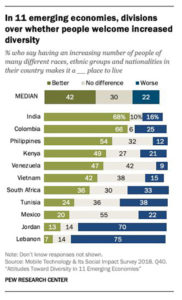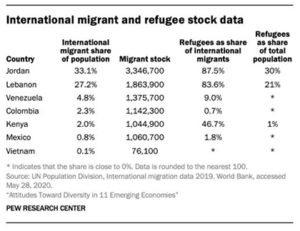Familiarity with diversity breeds acceptance – research
Interacting with people from different backgrounds produces more positive attitudes about diversity, new research has found.
A study by the Washington-based Think Tank, the Pew Centre, shows most people across the globe think their countries are better off thanks to the increasing number of people of different races, ethnic groups and nationalities who live there.
 A survey conducted in late 2018 in eleven emerging economies found 42 per cent of people thought diversity made their nation better while 22 per cent said it made things worse, and a large minority (30 per cent) said these changes make no difference.
A survey conducted in late 2018 in eleven emerging economies found 42 per cent of people thought diversity made their nation better while 22 per cent said it made things worse, and a large minority (30 per cent) said these changes make no difference.
“But there was significant variation across the countries studied. For example, in Jordan and Lebanon, both heavily affected by the Syrian refugee crisis, seven-in-ten or more said their country has been made worse by increasing diversity,” the report said.
 “In contrast, around half or more in Kenya (49 per cent), the Philippines (54 per cent), Colombia (66 per cent) – all refugee receiving countries – and India (68 per cent) said their country is improved by these demographic changes,” it said.
“In contrast, around half or more in Kenya (49 per cent), the Philippines (54 per cent), Colombia (66 per cent) – all refugee receiving countries – and India (68 per cent) said their country is improved by these demographic changes,” it said.
In most countries surveyed, people who interact more with those who are different from them – whether religiously, ethnically or racially – tended to be more positive toward societal diversity, the report said.
These views about diversity in the country are mirrored in people’s attitudes toward migrants or refugees living in their country.
In Lebanon, Jordan, Kenya and Mexico, people were asked whether they had favorable views of refugees living in their country, while in Colombia, Venezuela and Vietnam they were asked about migrants.
Across these seven countries, those who had more positive views of particular migrant or refugee groups were also more likely to say increasing levels of diversity in the country are good.
“Although this relationship is consistent across the countries in the study, views of refugees or migrants vary markedly across the countries surveyed. For example, in Mexico, Colombia and Lebanon, around half or more rated refugees or migrants unfavourably,” the report said.
 “In recent years, both Mexico and Colombia have seen a surge of migrants fleeing difficult conditions in other Latin American nations. Mexico has seen a surge of migrants from El Salvador, Guatemala and Honduras (collectively known as the Northern Triangle) arriving at its northern border with the United States,” it said.
“In recent years, both Mexico and Colombia have seen a surge of migrants fleeing difficult conditions in other Latin American nations. Mexico has seen a surge of migrants from El Salvador, Guatemala and Honduras (collectively known as the Northern Triangle) arriving at its northern border with the United States,” it said.
“Similarly, Colombia has seen a recent increase in the number of migrants from neighbouring Venezuela, following political turmoil in the country. And Lebanon has been the largest host of Syrian refugees per capita in recent years, with an estimated total of one million, the report said.
By contrast, in Kenya, Jordan, Vietnam and Venezuela, around half or more rated migrant and refugee groups favourably.
The eleven countries in this survey were chosen based on a number of key criteria, including their middle-income status, that they contain a mix of people with different levels of technological ownership, and their high levels of internal or external migration, among others.












